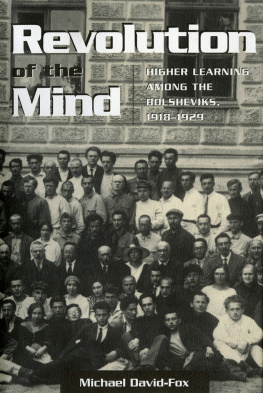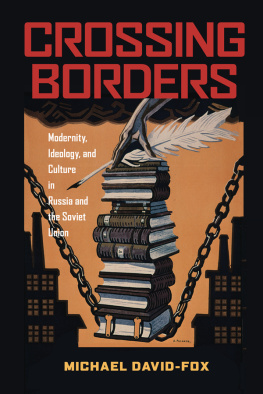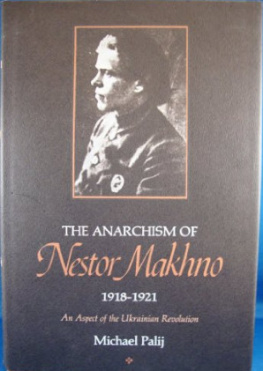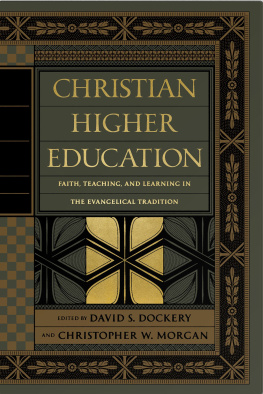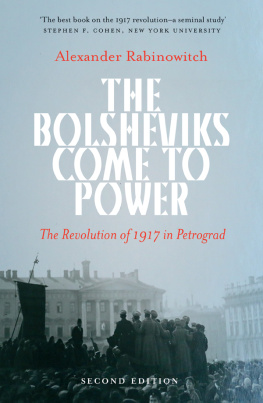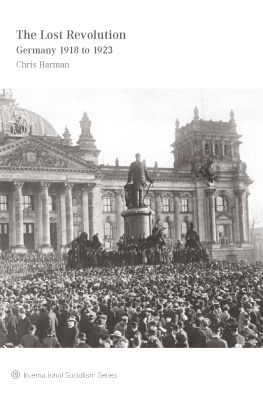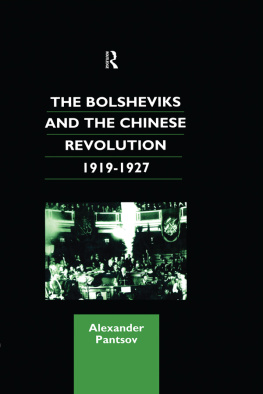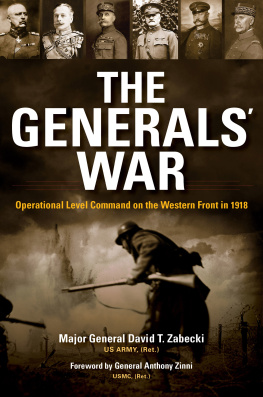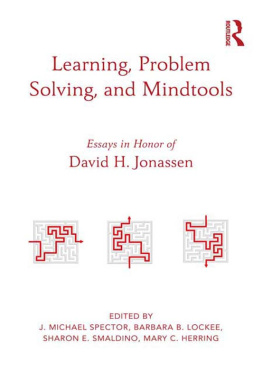Michael David-Fox - Revolution of the Mind: Higher Learning Among the Bolsheviks, 1918-1929
Here you can read online Michael David-Fox - Revolution of the Mind: Higher Learning Among the Bolsheviks, 1918-1929 full text of the book (entire story) in english for free. Download pdf and epub, get meaning, cover and reviews about this ebook. year: 1997;2016, publisher: Cornell University Press, genre: Politics. Description of the work, (preface) as well as reviews are available. Best literature library LitArk.com created for fans of good reading and offers a wide selection of genres:
Romance novel
Science fiction
Adventure
Detective
Science
History
Home and family
Prose
Art
Politics
Computer
Non-fiction
Religion
Business
Children
Humor
Choose a favorite category and find really read worthwhile books. Enjoy immersion in the world of imagination, feel the emotions of the characters or learn something new for yourself, make an fascinating discovery.
- Book:Revolution of the Mind: Higher Learning Among the Bolsheviks, 1918-1929
- Author:
- Publisher:Cornell University Press
- Genre:
- Year:1997;2016
- Rating:5 / 5
- Favourites:Add to favourites
- Your mark:
- 100
- 1
- 2
- 3
- 4
- 5
Revolution of the Mind: Higher Learning Among the Bolsheviks, 1918-1929: summary, description and annotation
We offer to read an annotation, description, summary or preface (depends on what the author of the book "Revolution of the Mind: Higher Learning Among the Bolsheviks, 1918-1929" wrote himself). If you haven't found the necessary information about the book — write in the comments, we will try to find it.
Revolution of the Mind: Higher Learning Among the Bolsheviks, 1918-1929 — read online for free the complete book (whole text) full work
Below is the text of the book, divided by pages. System saving the place of the last page read, allows you to conveniently read the book "Revolution of the Mind: Higher Learning Among the Bolsheviks, 1918-1929" online for free, without having to search again every time where you left off. Put a bookmark, and you can go to the page where you finished reading at any time.
Font size:
Interval:
Bookmark:
1 /
AND REVOLUTIONARY MISSIONS
IN HIGHER LEARNING
From the first tentative innovations of the revolutionary underground to the rise of a unified system of party learning after 1920, the creation of educational institutions under Bolshevik Party auspices underwent a transformation of enormous scale and velocity one that cuts to the heart of the relationship between Bolshevik missions and party institutions in revolutionary Russia. This historical vantage point affords some unexpected vistas. The goals of party education, no matter how often overshadowed by utilitarian political concerns (the desperate need to train loyal party cadres), in a succession of widely differing periods consistently blended visions of long-range transformation with imperatives of the most immediate practical utility. This potent mix, embedded in this learning of a new type, allowed the making of party schools to play a decisive role in broadening the Bolshevik project on the third front.
Yet party education was reborn after 1917 as only one of several educational and academic movements whose various impulses had been well established in opposition to tsarist policies, and which seized the revolutionary moment to expand and institutionalize lower-class, mass, and adult education. In the civil war period, moreover, party education arose as one of the least visionary of several forms of education that became alternatives to prerevolutionary institutions, since short-term crash training programs dominated its agenda. Yet by 192021 party learning, from remedial to advanced, was constituted as both a unified academic system and a cultural-ideological movement, as a Bolshevik agenda on the third front was endorsed and linked to party institutions.
Just as revolutionary missions may lead to the creation of new institutions, those new institutions may in turn shape revolutionary missions, channeling and, in a sense, re-creating them. This dynamic, fraught with irony and subversion of intent, was an intrinsic part of the post-civil war rise of communist education as a vehicle for Bolshevik missions on the third front. As new communist institutions became entrenched in the 1920s, codifying their own type of learning and scholarship, and consolidating their own evolving culture and place in the party polity, they increasingly provided the basis for the model that Bolshevism had lacked in higher learning when the revolution carne. Party education was traveling on a trajectory from a vehicle to a shaper of missions, from a revolutionary alternative to apart of the Soviet establishment.
For a crucial period in the 1920s, however, party academia remained an alternative challenge at the forefront of revolutionary missions on the cultural front. The rise of this party system bifurcated higher learning, in policy as in perception, as the Party created Bolshevik equivalents of academies, research institutes, universities, middle schools, and so on. It was party schools more Marxist, more communist, and more proletaria n than the old institutions which claimed the mande of revolution. Despite decisive changes the new order had brought to the old universities and VUZy, many policymakers began to analyze higher learning in terms of binary oppositions between old and new, state and party, universities and party schools, bourgeois and proletarian.
In the successive political-cultural shifts of the Great Break, the Great Retreat, and the Great Purges in the 1930s, all of higher education was at least outwardly Sovietized and Stalinized; the dual educational system of NEP lost its significance. With the early Soviet polarity between bourgeois and red muted if not obliterated, party education no longer commanded its extraordinary position of the 1920s. To be sure, party schools had become a permanent part of the system; in the 1930s, and especially after the reorganization of 1946, party education came to In this sense, the heyday of Bolshevik party education was when the making of institutions was still intertwined with revolutionary attempts to jettison the old and define the new.
Origins of Bolshevik Culture-Building, 19091911
Bolshevik education, given its singular importance for recruitment, inculcating rudimentary theory, and achieving consciousness, had roots in practices in the revolutionary movement that predated the notion of an alternative party education and, for that matter, the existence of political parties in Russia. The incipient social-democratic movement of the 1880s inherited underground study circles, or kruzhki, as the most durable means of transmitting revolutionary ideas. For generations of expelled students and workers with little formal education, they also provided makeshift apprenticeships in the techniques of agitation and conspiracy.
The Bolshevik wing of Russian Social-Democracy, formed in 1903 and almost immediately thrust into the Revolution of 1905, faced crisis and attrition in period of reaction following the suppression of the revolutionary movement and the Stolypin coup detat. Yet just as a system of party education was largely created amid perceptions of a post-revolutionary retreat in the 1920s, the first party schools emerged in post-1907 exile to attempt the transformation of workers into party leaders, intellectuals, and agents. The reversal of open revolutionary offensive thus led, in both experiences, to a decisive broadening of Bolshevik revolutionary goals in education, culture, and science.
No matter how short-lived the three party schools of 190911 proved, the experience that created them influenced the Bolshevik tradition. The maximalist dreamers of this epoch, the Left Bolshevik (Vpered) group led by the philosopher of proletarian culture, Aleksandr Bogdanov, were effectively defeated by the hardheaded centrist Leninists by 1912. But the victors proved susceptible to elements of the cultural dreams of their rivals, just as the Vperedists were no strangers to hard-headed politics and utilitarian cadre production. As a result, the Vperedists innovative and organicist missions were wedded to the creation of party schools, even as the creation of party schools became enmeshed in Bolshevik high politics.
The German, French, and Belgian Social-Democratic parties were the first to found higher party schools, the Germans in 1905, and this precedent was duly noted by Lenins group after it had founded its own school at Longjumeau. From here it was but a step to associating the handful of workers attending the underground schools with the birth of our own proletarian intelligentsia. Party education began as an attempt to replace wayward intelligenty with reliable workers, a modest effort immediately endowed with grandiose symbolic resonance; it blossomed after 1917 into a quest ultimately to supplant the old intelligentsia tout court.
The Leninists and Vperedists teetered on the verge of a split in Bolshevism; Lunacharskii later dubbed it a semi-schism. The creed of these innovative Bolsheviks intertwined making revolution with the creation of a collectivist, proletarian culture that would usher in a new kind of art, literature, and science.
Yet these origins of what later became central communist cultural missions in the 1920s have been interpreted, like the NEP era when many of them were mobilized, largely through a constricting choice between counterfactual alternatives and the seeds of totalitarianism. Bogdanovism has appealed to some as a lost choice, a libertarian program for worker self-empowerment that contrasts with the authoritarian tutelage of Lenins professional revolutionaries; to others, the Vperedist vision of the socialist intellectual, as arbiter of the groups new theories of collective consciousness and proletarian culture, sowed the seeds of totalitarian domination in realms passed over by the Leninists.
Next pageFont size:
Interval:
Bookmark:
Similar books «Revolution of the Mind: Higher Learning Among the Bolsheviks, 1918-1929»
Look at similar books to Revolution of the Mind: Higher Learning Among the Bolsheviks, 1918-1929. We have selected literature similar in name and meaning in the hope of providing readers with more options to find new, interesting, not yet read works.
Discussion, reviews of the book Revolution of the Mind: Higher Learning Among the Bolsheviks, 1918-1929 and just readers' own opinions. Leave your comments, write what you think about the work, its meaning or the main characters. Specify what exactly you liked and what you didn't like, and why you think so.

